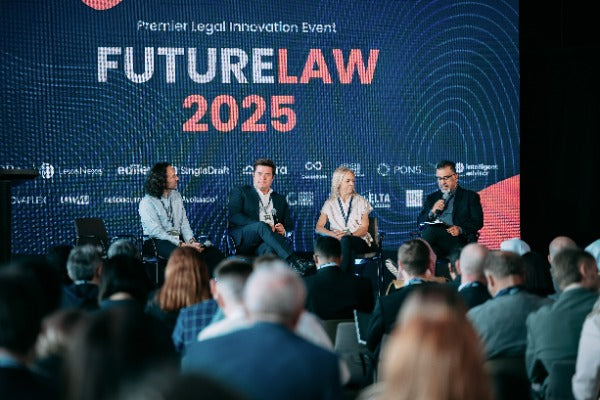
FutureLaw 2025: The Future of Legal Practice and AI
FutureLaw 2025 made one thing clear—AI is no longer a distant future; it is already embedded in legal practice. The challenge now is ensuring its responsible and effective integration while balancing ethical and strategic considerations.

TalTech Law School’s panel on legaltech education
The discussion on AI in legal education was particularly revealing. Law schools must adapt to prepare students for the AI era, where future-ready legal training requires digital skills alongside traditional legal knowledge. The TalTech panel emphasised that understanding AI tools is no longer optional for legal professionals—it has become a necessity. Large Language Models (LLMs) are transforming legal research, automating document review, and streamlining client communication. As one speaker put it, “Prompt engineering might just be the new legal drafting.” AI is shifting the core skills required in legal work, demanding new approaches to training and professional development. The TalTech panel featured Tanel Kerikmäe, Barbora Obračajová, Valérie M. Saintot, Lilla Nóra Kiss, and Dan Shefet, who contributed valuable insights on AI governance, digital sovereignty, and the necessity of embedding technology into legal education. Their perspectives reinforced the idea that legal training must not only incorporate AI tools but also foster critical thinking around their ethical and practical applications. Shefet’s reflections on AI regulation added depth to the conversation, highlighting the importance of legal accountability in an increasingly digital landscape.

Alexander Bitskov, Co-Founder of FutureLaw Conference
Alexander Bitskov offered a blunt observation: “Just because you’re using ChatGPT now doesn’t make you an innovator” —a reality check for legal professionals eager to embrace AI. AI usage must go beyond basic experimentation—it requires structured implementation, clear objectives, and an understanding of its limitations. Victoria Swedjemark emphasised that the common mistake is jumping into fancy tools without first focusing on processes, structures, and data quality.
Of course, Bitskov’s sharp insights weren’t the only thing that stood out—his well-known dad jokes made their way into the conversation, much to the audience’s amusement (or groans). Whether it was his classic “Why are lawyers like fine wine? They get better with age… and expensive with time” or his painfully predictable “What’s the difference between a lawyer and a fortune cookie? The fortune cookie gives you bad news for free,” his humour added a lighthearted touch to an otherwise serious discussion. While his tech expertise is undeniable, his joke delivery might need a little fine-tuning.

Damien Riehl, VP Solutions at vLex
Damien Riehl’s keynote stood out for its practical, data-driven approach, offering inspiration and takeaways that will resonate long after the event. He once again challenged the traditional billable hours model, making a strong case for the inevitable shift to flat fees. His perspective reinforced the growing need for legal professionals to rethink the value they create in an AI-driven landscape.
The following discussion on AI and intellectual property at FutureLaw 2025 highlighted the evolving challenges and opportunities for legal professionals. Damien Riehl, Heikki Ilvessalo, Tiphanie Bent, and Brian W. Tang explored how refining data quality, information ownership, and knowledge graphs can unlock the full potential of AI in legal practice. As AI innovation accelerates, keeping pace with advancements is no longer optional—it has become a strategic necessity. Together with Riehl, Tang, Bent and Ilvessalo, attendees explored the future of lawyers’ contributions to intellectual property within legal firms. The discussion emphasised the relationship between data quality, information ownership, and knowledge graphs, demystifying the structure of Large Language Models (LLMs) into atomic data bites. Revisiting these architectural fundamentals provided an opportunity to support the democratisation of data science and AI literacy, ensuring that legal professionals approach AI with a foundation of critical thinking rather than mere adoption.

Fayola-Maria Jack, Mariana Hagström, Alex Hamilton and Naomi Gaston
The conversation on smarter contracting at FutureLaw 2025 reinforced the need for efficiency without sacrificing clarity. Alex Hamilton championed a hybrid approach to contract automation, emphasising the role of deterministic algorithms in preserving accuracy and strategic insights. His perspective highlighted that automation should not replace thoughtful legal judgment but rather enhance it by streamlining repetitive tasks while maintaining precision. Naomi Gaston of ContractPodAI echoed this sentiment, reminding attendees that understanding a company’s risk appetite is crucial before implementing new technology. The discussion underscored that while AI and legal tech can reduce delays and disputes, their success depends on well-structured processes and a commitment to simplicity—overcomplicated systems often create more problems than they solve.

Cheryl Ashman, Business Intelligence at White & Case LLP
Amid rapid technological advancements, one crucial truth remains: human connection matters. Trust, empathy, and communication often outweigh technical sophistication when it comes to decision-making. The best product or service isn’t always the one selected—clients gravitate toward professionals who listen, understand their needs, and engage on a personal level. As Brian Liu aptly noted, those who build genuine connections ultimately shape lasting relationships and drive meaningful impact.
At FutureLaw 2025, Cheryl Ashman delivered an inspiring keynote that explored the development of personal skills for digital transformation. The discussion reinforced that while innovation is reshaping industries, success depends not only on technological expertise but also on the ability to navigate human interactions with authenticity and emotional intelligence. As organisations integrate AI and automation, prioritising the human element will define the leaders and changemakers of tomorrow
FutureLaw 2025 reminded attendees that while AI is accelerating the pace of change, the essence of law remains unchanged. The future of legal practice will depend on how professionals blend technology with human expertise to create a more accessible, transparent, and fair legal system. The conference was a turning point, demonstrating that legal professionals aren’t just reacting to change—they are leading it.
Ultimately, FutureLaw 2025 reinforced that AI adoption in law is not just about technology—it is about strategy, ethics, and education. Legal professionals must own the conversation, lead the change, and ensure AI serves the profession rather than dictates its future.





